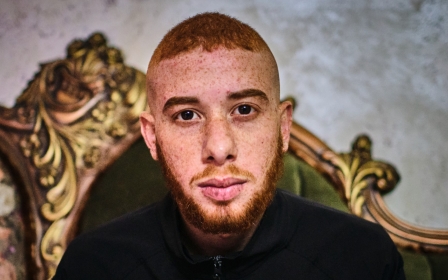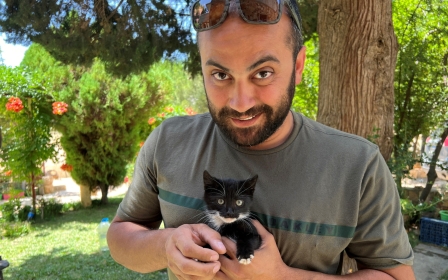Israel-Palestine war: Families of Palestinians stripped and detained recall ‘humiliating’ Israeli arrests

Stripped to their underwear, barefoot, and sitting on the street with their hands covering their heads, dozens of Palestinian men can be seen in video footage after being arrested by Israeli soldiers in the northern Gaza Strip.
The video, published on 7 November and apparently recorded by the Israeli military, was taken in the town of Beit Lahia following an Israeli mass arrest campaign against residents and displaced people in multiple residential buildings and two schools run by the United Nations Relief and Works Agency (Unrwa) - Khalifa Bin Zayed and New Aleppo.
Middle East Eye spoke with relatives of those who were detained, eyewitnesses and residents of the area where the incident occurred.
"[The residents] of three buildings belonging to the Kahlout family were detained, [including] my brothers, cousins, and other displaced people from the family who had taken refuge in our area," journalist Mohammed al-Kahlout, who is displaced in the southern Gaza Strip, told MEE.
"They detained around 40 people, I could recognise 12 of them in the photos and videos that were shared [on social media]."
Kahlout's family members told him that, before they were detained, his brothers and cousins were severely abused by the Israeli soldiers who had "the intention to humiliate and leave them half-naked" in the street, where they remained for 19 hours.
"They took them from the house, beat them, and forced them to take off their clothes. They handcuffed them, and from 7am to 2am they were left on the street in the cold without any clothes," Kahlout said.
The Israeli military later released a number of the detainees, while others were taken to an unknown location.
Eyewitnesses who spoke to MEE have suggested they might have been taken to a detention centre in Zikim, between the Gaza Strip and Tel Aviv.
"A young man from the Lubbad family told me that seven members of their family were released. They were left near the borders of Beit Lahia and forced to return on foot," Kahlout added.
In one of the buildings that were forcibly evacuated was the head of the Gaza office of the New Arab Agency, Diaa al-Kahlout, and his family.
According to eyewitnesses, all those in the building belonging to Diaa's family and older than 15 years were asked to hand themselves to the Israeli forces.
"Diaa was displaced early in the war and moved to stay with his family in the al-Karama [area]. The soldiers detained Diaa, his two brothers, and three of his nephews. They later released them, but Diaa and two others are still detained," Mohammed Kahlout said.
"The Israeli forces blew up and burned homes in the area, and one of them was Diaa's family home."
According to a member of the Lubbad family, Israeli forces had called on the residents of seveal buildings, including the two schools, to go down to the street.
Families, including men, women and children, followed the instructions. They were held by the soldiers for a couple of hours before the women and children were released, while men were ordered to strip to their underpants and sit in lines on the street.
Journalists, students, and teachers
MEE obtained a list of full names, ages, and professions of 25 people among those arrested.
While Israeli sources announced that the detainees were members of Palestinian armed factions, the list obtained by MEE, as well as eyewitnesses accounts, indicate that those detained are academics, journalists, teachers at Unrwa-run schools, school students, blue-collar workers, and employees with the Palestinian Authority.
Among the detainees were Darwish al-Gherbawi, 58, a principal of an Unrwa-run school; Ahmed Akram Mohammed Lubbad, 35, a teacher at an Unrwa-run school; Youssef Khaled Mohammed Lubbad, 15, a school student; Tamer Omar Surour, 35, a barber; Atiya Faye Lubbad, 43, a tailor; Ibrahim Abdul-Raouf Lubbad, 35, a computer engineer; and university students Abdullah Akram Lubbad, 19; Abdul-Rahman Abdul-Raouf Lubbad, 19; Hamza Jamil Lubbad, 19; and Jihad Abdul-Raouf Lubbad, 22.
A resident of one of the residential buildings that were evacuated by the army said that the soldiers had banged on their doors with the bottom of their weapons to force residents to open.
"They were calling [on us], using microphones, to go down. We heard the voices, but we did not know this was the army. [Our neighbours] the Abu Sharkh family went down." The soldiers forced the men "to take off their clothes and wait in the street," she said, asking for her name not to be used.
"They then started to roam the buildings and evacuate them, apartment by apartment. They hit the doors hard. When they reached our home, the family's men told us to keep silent so that they might leave us and walk away. But we said it was not safe to stay in the building alone, they might [blow up] the homes.
"We held a white flag and went out. They took the men and told us [women] to sit on the stairs. They forced the men to take their clothes off and ordered us to go to the school. My father is still with them."
On Thursday, Israel's Broadcasting Authority said that the Israeli military has jailed around 700 Palestinians from the Gaza Strip and placed them in administrative detention since 7 October.
They do not include the unidentified number of people who crossed the borders with Israel and were detained at the beginning of the war.
"We still do not know where they are, but we are sure they are torturing them. I do not know what they want to do with them, they have nothing to do with Hamas or any political parties," the woman said.
Middle East Eye propose une couverture et une analyse indépendantes et incomparables du Moyen-Orient, de l’Afrique du Nord et d’autres régions du monde. Pour en savoir plus sur la reprise de ce contenu et les frais qui s’appliquent, veuillez remplir ce formulaire [en anglais]. Pour en savoir plus sur MEE, cliquez ici [en anglais].






